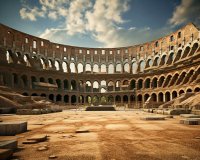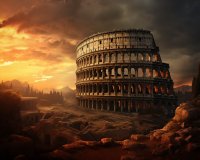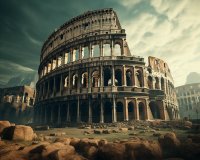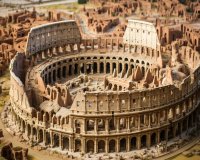From Gladiator Battles to Senate Debates: Reliving Rome’s Pinnacle
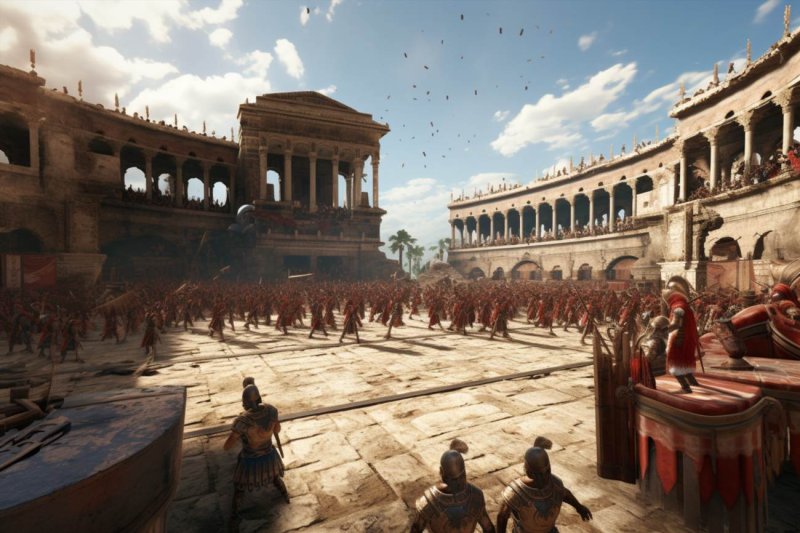
From Gladiator Battles to Senate Debates: Reliving Rome's Pinnacle
Rome, the eternal city, has been a cradle of history and civilization. From the grandeur of gladiator battles in the Colosseum to the eloquence of Senate debates in the Roman Forum, the city stands as a testament to the heights of human achievement. Let's embark on a journey to relive Rome's pinnacle.
The Colosseum: Where Gladiators Roared
The Colosseum, also known as the Flavian Amphitheatre, is an iconic symbol of ancient Rome. This massive amphitheater, constructed in AD 70-80, could hold up to 80,000 spectators. It was the epicenter of gladiator battles, where warriors fought for their lives and the crowd's adulation.
Gladiatorial combat was a brutal and captivating spectacle, where men armed with swords, tridents, and nets faced off against each other or even ferocious beasts like lions and tigers. The Colosseum's architecture, with its underground tunnels and lifts, allowed for dramatic entrances and exits, creating a show that still captures our imagination today.
Roman Engineering Marvel
The construction of the Colosseum was a testament to Roman engineering prowess. It featured an intricate system of tunnels, chambers, and trapdoors, making it possible to stage a wide variety of events, from naval battles to mythological reenactments. The amphitheater's elliptical design also ensured that every seat had a clear view of the action, a feat of engineering brilliance.
The Roman Forum: Center of Politics and Discourse
Just a stone's throw away from the Colosseum lies the Roman Forum, the heart of ancient Roman political life. It was a bustling marketplace and the venue for public speeches, legal proceedings, and Senate debates. Here, Roman citizens gathered to discuss matters of state and witness the art of rhetoric.
The Roman Forum was the backdrop for some of history's most crucial decisions. It was where Julius Caesar was assassinated in 44 BC, leading to a series of events that would eventually result in the rise of the Roman Empire. The ruins of temples, basilicas, and arches in the Forum still stand as a testament to the city's rich political history.
The Art of Oratory
At the heart of the Roman Forum's significance was the art of oratory. Senators and politicians would deliver speeches to persuade their fellow Romans, shaping the destiny of the Republic. The most famous orators of Rome, such as Cicero and Cato the Younger, left a lasting legacy through their words and debates.
These debates were more than just political discussions; they were a reflection of the Roman values of eloquence, persuasion, and the pursuit of the greater good. The Roman Senate, often depicted in historical dramas, was a place where the fate of nations was determined through the power of words.
The Legacy of Rome
Today, Rome's rich history continues to inspire and captivate people from around the world. The Colosseum and the Roman Forum are not just archaeological sites; they are windows into the past, offering us a glimpse of a civilization that laid the foundation for modern Western culture, politics, and architecture.
From the blood-soaked sands of the Colosseum to the echoing debates in the Roman Forum, Rome's pinnacle remains a testament to the heights humanity can achieve in both spectacle and intellectual pursuit. It is a city where history lives on in every stone, column, and inscription, inviting us to relive its glory and learn from its legacy.
Rome: Semi-Private Roman Forum Myths and Legends Guided Tour
Discover the heart of the Ancient Roman Empire on this captivating guided tour of the Roman Forum. Delve into the city's rich history, myths, and legends while exploring the myths and stories that have shaped one of the world's most powerful empires.
Overview
Explore the historic center of the Ancient Roman Empire on this guided tour of the Roman Forum. Learn about Rome's gods, myths, and legends before discovering Palatine Hill on your own.
Details
Join us for an unforgettable journey through the myths and legends of ancient Rome. Explore the historic center of the powerful Roman Empire and learn about its gods, myths, and legends. From the founding of Rome by Romulus and Remus to the tales of Julius Caesar, immerse yourself in the stories of brave soldiers and cunning politicians as you walk through the once-great empire.
Perfect for all ages and backgrounds, this tour offers captivating ancient tales for kids and detailed insights into one of the most influential societies for adults. Be enthralled by the narratives that shaped the beliefs and values of this powerful empire.
Highlights
- Small-group tour limited to 10 people ensures an intimate experience
- Friendly and professional guide providing a comprehensive tour
- Immerse in the myths and legends of ancient Rome, from its founding to renowned historical figures
Meeting Point
L.go della Salara Vecchia, 00186 Roma. Look for the Kirba Tours sign or flag.
Important Information
What to bring: Passport or ID card (required for adults and children), not allowed: pets, weapons or sharp objects, large bags, glass objects. Visitors are subject to a metal detector security check upon entering the Roman Forum.
Additional Information: One group ticket is provided for the entire group; individual tickets cannot be issued for late arrivals.
Price: Starting from Kč 1,075 per person. Book your spot today and pay nothing now!
Customer Reviews: Rated 4.9/5 based on 118 reviews. Visitors praise the informative and engaging experience, highly recommending this tour.
Gladiator Battles: Experiencing the Peak of Rome
The gladiator battles of ancient Rome stand as a testament to the grandeur and brutality of a civilization at its peak. These spectacles, held in colossal amphitheaters like the iconic Colosseum, were more than just displays of martial prowess; they were a reflection of the values and entertainment preferences of Roman society.
The Colosseum: At the heart of these gladiatorial contests was the Colosseum, an architectural marvel that could host tens of thousands of spectators. Constructed with precision and engineering prowess, it became the epicenter of the gladiatorial games. The elliptical structure boasted a complex system of tunnels, chambers, and lifts that added to the drama unfolding in the arena.
The Gladiators: Gladiators, often slaves or prisoners of war, were trained rigorously in combat arts. They became the central characters in this gruesome form of entertainment. Each gladiator belonged to a specific class, distinguished by their weaponry and fighting style. The battles were not only about survival but also about showcasing skill and courage.
The Combat: Gladiator battles were diverse in nature, ranging from one-on-one duels to large-scale mock battles involving dozens of fighters. The combatants faced a variety of challenges, from wild animals to fellow gladiators armed with an array of weapons. The unpredictability of the fights added an element of suspense that kept the audience on the edge of their seats.
The Audience: Spectators played a crucial role in the success of these events. The cheers and jeers of the crowd influenced the fate of defeated gladiators, with a raised thumb signaling mercy and a turned thumb condemning the fallen warrior to death. The emotional connection between the audience and the gladiators intensified the impact of each battle.
The Cultural Significance: Beyond being a form of entertainment, gladiator battles held deep cultural significance in ancient Rome. They were seen as a reflection of virtues such as bravery, endurance, and martial skill. The games were also used as a tool by rulers to maintain control and divert the attention of the masses from societal issues.
Legacy: The legacy of gladiator battles extends far beyond ancient Rome. The concept of gladiatorial combat has inspired countless works of literature, art, and film. Even in the modern era, phrases like "fighting in the arena" are used metaphorically to describe intense competition and challenges.
Conclusion: Gladiator battles were a defining aspect of ancient Roman culture, showcasing both the grandeur and the brutality of the civilization. The Colosseum, the gladiators, the diverse combat scenarios, and the emotional involvement of the audience all contributed to an experience that transcends time. These spectacles, with their complex mix of entertainment and cultural symbolism, remain an enduring symbol of the might and complexity of Rome.
Senate Debates: Dialogues and Discussions in Rome
The ancient city of Rome, often referred to as the cradle of democracy, witnessed some of the most profound political debates in history. At the heart of Roman governance was the Senate, an institution that played a pivotal role in shaping the destiny of the Roman Republic.
The Senate: A Nexus of Power
The Roman Senate was a body of esteemed individuals, known as senators, who were responsible for deliberating on matters of state. Comprising primarily of the Roman elite, senators were drawn from influential families and held significant sway over political, military, and social affairs.
Senate Debates: A Forum for Ideas
The Senate debates were held in the Curia Julia, an architectural marvel located in the heart of the Roman Forum. Here, senators gathered to discuss a wide range of issues, from matters of foreign policy to the enactment of laws that would govern Roman society.
The debates were characterized by passionate rhetoric, where senators articulated their viewpoints, often engaging in eloquent oratory to sway their peers. These discussions were integral in determining the course of action that the Republic would undertake.
Key Figures in Senate Debates
Among the most prominent figures in Roman Senate debates were orators like Cicero, known for his exceptional rhetorical skills, and Julius Caesar, a military genius whose influence extended far beyond the battlefield.
Contentious Issues and Critical Decisions
The Senate deliberated on a myriad of topics, ranging from territorial expansion to matters of governance. One of the most pivotal debates centered around the fate of Julius Caesar, whose growing power posed a threat to the traditional republican system.
Another critical moment in Roman history was the Catilinarian Conspiracy, where the Senate faced a significant internal threat. Cicero's eloquent speeches played a crucial role in thwarting the conspiracy and preserving the integrity of the Republic.
Legacy of Senate Debates
The legacy of Senate debates in Rome is far-reaching. It laid the foundation for the principles of representative democracy, influencing political thought for centuries to come. The art of persuasive oratory, honed within the walls of the Curia Julia, continues to be a cornerstone of political discourse.
In conclusion, Senate debates in Rome were the crucible of democracy, where ideas clashed and decisions of immense consequence were made. The echoes of those debates continue to resonate through the annals of history, reminding us of the power of dialogue and the importance of reasoned discourse in shaping the course of nations.


